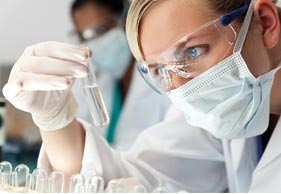Toxic chemicals easily find their way into our bodies through the air we breathe, the food we eat, and the water we drink. We also ingest foreign chemicals when taking medicine or drugs,
or when using alcohol or tobacco. And although regular exercise is the key to a healthy body, it also increases the production of toxins in the body. Various toxins can also be produced when muscles are active and they are carried by the blood through the body. Although the body is designed to eliminate toxins, it cannot always handle the overload present in today’s environment. Dr Gys du Plessis, a medical doctor with a keen interest in holistic and integrative medicine, explains how you can help your body get rid of toxins.
EXPLAINING DETOXIFICATION
Detoxification (also known as biotransformation) is, in essence, a term used to describe what our bodies do with potentially toxic compounds. It is a process in which the liver plays a crucial role, mainly to transform toxic compounds into harmless end products.
In our modern lifestyle our bodies are increasingly bombarded by external toxic substances from the environment. These are substances like heavy metals, plastic compounds, chemical compounds, pesticides in fruit and vegetables, as well as xenoestrogens in our food. We also ingest foreign chemicals when taking medicinal or illicit drugs, or when using alcohol
or tobacco. Adding to this misery are the enormously high stress levels and speed of the information era, which leads to even higher levels of free radical circulation in the body.
In 1991, a report about environmental issues stated that each year, chemical companies in the United States manufacture over two trillion kilograms of 9 000 different chemicals and release over three billion kilograms of 650 different chemical pollutants into the atmosphere and water. Exposure to these ubiquitous chemicals has created an overall toxic burden that affects everyone, from the old to the very young.
TOXINS IN THE BODY
Ironically, toxins do not only come from external sources, they are also produced within the body. For example:
The metabolic breakdown products of chronic allergies and sinusitis may place an additional burden on detoxification.
Normal systemic metabolism produces intermediary metabolites that require detoxification.
Nutritional imbalances and insufficiencies can compromise detoxification pathways, allowing the progressive build up of toxins to impose a significant, and sometimes overwhelming, burden on the body.
Lastly, and in stark contrast with what the name implies, the detoxification process itself can generate free radicals that are damaging to cellular tissues.
EXERCISE AND TOXINS
All of these toxins and free radicals induce inflammation in the body, which in turn leads to energy depletion and accelerated degeneration or ageing. Free radicals are a natural by-product
of oxidation. Even high performance athletes are prone to excessive free radical damage from intensive exercise.
as headaches, muscle and joint pain, chronic fatigue, and allergy
or flu-like symptoms.
The literature further suggests a clear association between the ability of the body to efficiently biotransform toxins, and the origin of various puzzling chronic diseases such as fibromyalgia, multiple chemical sensitivities, and chronic fatigue syndrome. Furthermore, recent research supports the link between chronic neurological diseases, such as Parkinson’s, as well as certain types of cancer and
auto-immune disorders like rheumatoid arthritis, with the subject’s ability to adequately detoxify.
The transformation of toxins by the liver broadly takes place
in two phases. These processes of Phase I and Phase II are energy-sapping and very dependent upon adequate levels
of supporting nutrients. Biotransformation tests, which are very patient specific, are used to compound nutraceutical supplements to support optimum Phase I and II activity. This will help to: prevent muscle tissue breakdown; assist in stabilizing blood glucose levels; and protect the body against free radicals.
In achieving this, the intracellular energy cycle is accelerated with enhanced performance. The test results with the recommended supplements are unique for each person and give meaning to
the concept of personalized medicine – the integrative approach to the future.
The application of this concept in addressing biotransformation imbalances has enormous potential for more efficient treatment of many disorders for which current treatment methods
are not very successful. Even more exciting is the possibility
of preventing many degenerative disorders and the improvement of performance in athletes.
TIPS TO REDUCE TOXINS AND FREE RADICALS IN THE BODY
1
Drink plenty of mineral water – enough to urinate two litres per day.
2
Eat as much fresh/organic fruit and vegetables of different colours as possible.
3
Avoid hard fats of animal origin and refined sugars.
4
Ensure a healthy gut by ingesting lots of soluble and insoluble fibre as well as a good probiotic.
5
Test your liver’s ability to biotransform and use natural supplements that will support the liver
during detoxification.
Dr Gys du Plessis is a medical doctor with a very keen interest in holistic and integrative medicine. His core mission in life is the integration of spirituality and relationships into physical healing and wholeness.
He is currently busy with a fellowship programme in integrative medicine through the American

